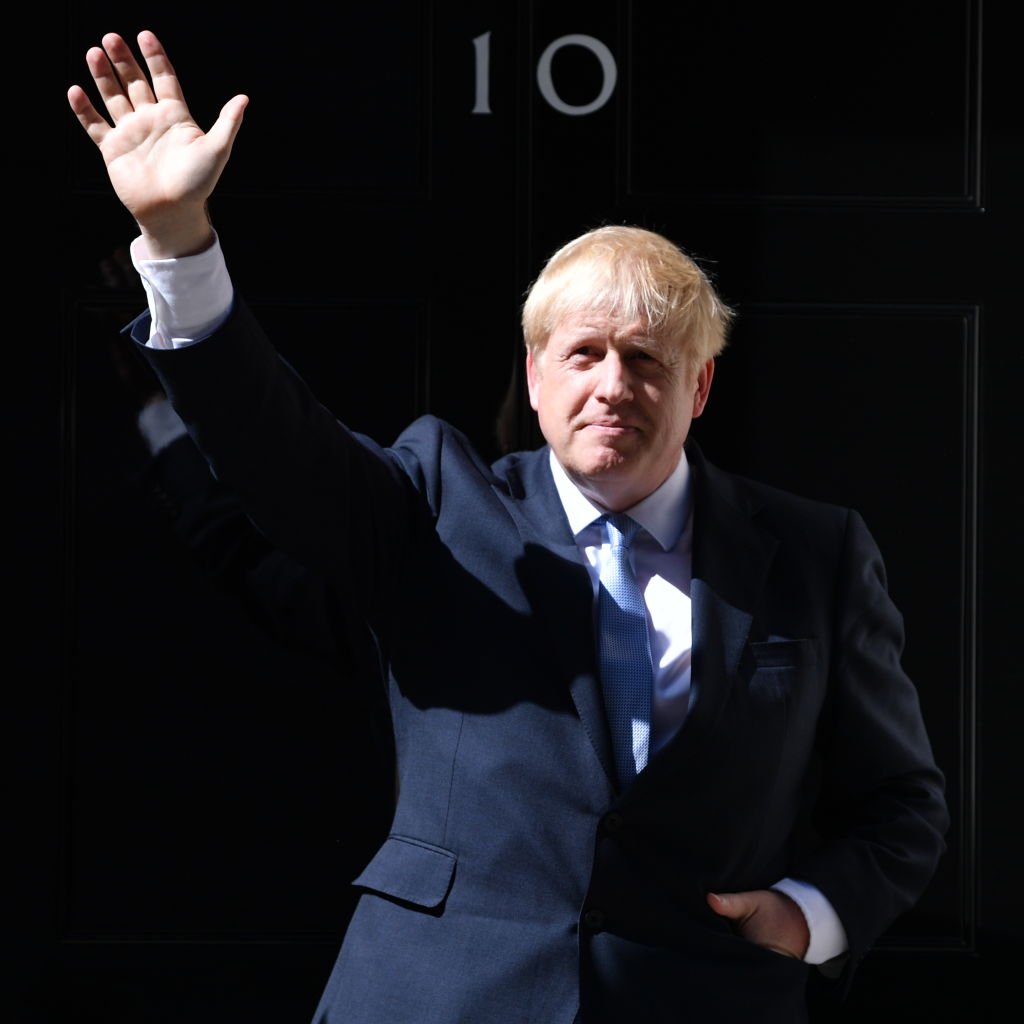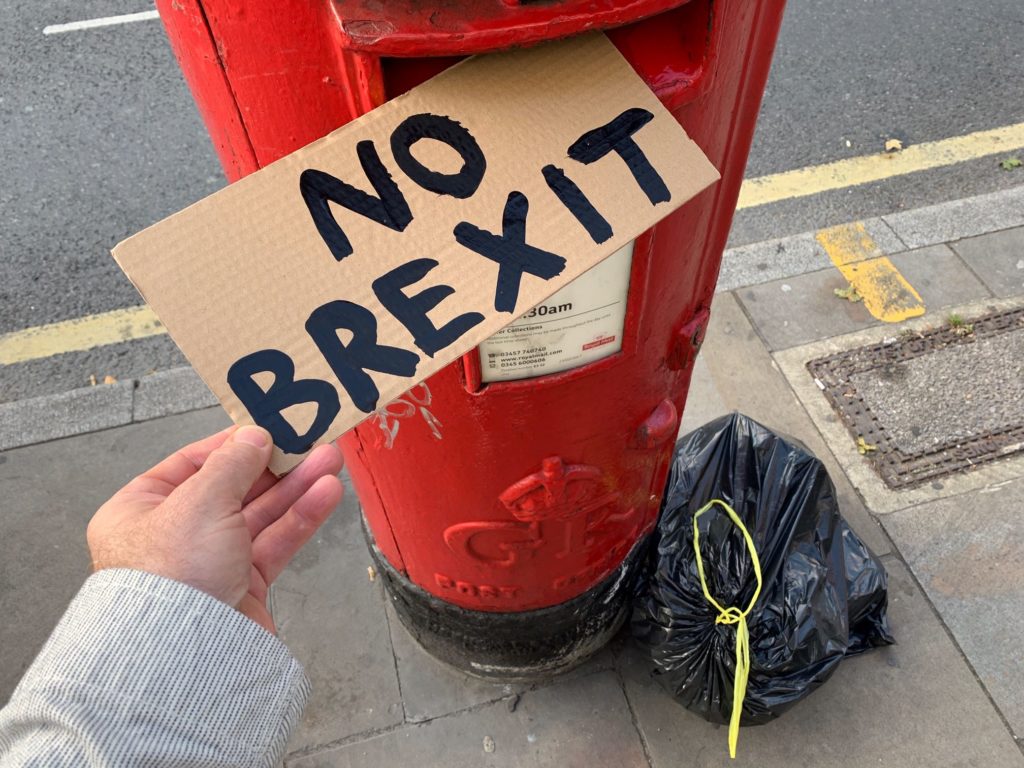Politics
‘This Feels Worse Than Trump’: Artists Voice Anguish After Boris Johnson’s Landslide Victory in the British General Election
What many artists feared most this year has just come true.

What many artists feared most this year has just come true.

Javier Pes &
Naomi Rea

The artist Peter Liversidge has been posting mail art with a no-Brexit message to Number 10 Downing Street for months. Politely addressed to the “current Prime Minister,” the London-based artist has, so far, sent more than 450 notes. As of yet, he has received no reply. Now, the day after Boris Johnson’s landslide general election victory, Liversidge vows to carry on, posting another work this afternoon. But like many artists opposed to Johnson’s right-wing populist version of Conservatism, Friday the 13th is the day their worst nightmare came true.
“This feels worse than Trump as the Tories have such a horrific backstory—for generations,” Liversidge tells Artnet News. The historic scale of the Conservative Party’s victory was largely due to its success in appealing to voters in parts of the North and Midlands of England who had traditionally voted Labour. Johnson’s personality and simplistic promise to “Get Brexit Done” by January combined with an aversion among many white working-class voters to the Labour leader, Jeremy Corbyn, and his version of Socialism with a capital “S.” All in all, the party slumped to its worst defeat since 1935.
“It feels like dropping back into the early to mid-’80s,” Liversidge says, referring to the decade dominated by Margaret Thatcher’s brand of free-market Conservatism. Johnson is a very different politician. An opportunist, and not an ideologue, whose default mode is boosterism, he has been accused of following a Trumpian playbook to secure victory.

The artist Peter Liversidge’s No-Brexit mail art series to the Prime Minister will continue. Courtesy of the artist.
In the final days of the election campaign, several artists spoke out to encourage people to oust the Tories by voting Labour, or tactically where the smaller Liberal Democratic party had a foothold in England or Wales. The four winners of this year’s Turner Prize used their acceptance speech to make a statement addressing the divisions in the UK that have been deepened by the battle to leave or remain in the European Union. They jointly accepted the prestigious award, sporting “vote Labour” badges—and nominee Tai Shani wore a “TORIES OUT” necklace.
In their joint statement, the artist collective wrote: “The Turner Prize is given to ‘a British artist’ or artist working in Britain. This year, as it has often done in the past, the prize has sought to expand what it means to be ‘British.’ We find this significant in an era marked by the rise of the right and the renewal of fascism in an era of the Conservatives’ hostile environment, that has paradoxically made each of us and many of our friends and family increasingly unwelcome again in Britain.”
Like many in Britain and abroad, Hannes Koch, the co-founder of the London- and Berlin-based collective Random International, stayed up to watch the general election coverage on television. It became clear that Johnson was on course for an emphatic win before midnight. (Use of the “F”-word correspondingly spiked on social media.)
“It’s admittedly a little hard for an outsider to understand how a country can screw itself up so thoroughly,” Koch says, “and on so many levels.” He still has hope, however, that art might play an ameliorative role in the future of British society. “We need raging artists who continue to provide truthful and empathic space for debate through their work, and we all need to do our part in building fearless and loud alliances between science, politics, and society who fight against the demise of hope and truth.”
The Belgian-American artist Cécile B. Evans, who is based in London, tweeted their support of Labour on the eve of election night. The morning after, they tweeted “Where do we riot”, expressing the feeling of many at the misinformation and dogwhistle political messages used in the campaign and before that the Vote Leave campaign. The artist Anish Kapoor, who sounded gloomy yesterday when he urged people to vote Labour via Instagram, simply wrote: “What sadness” today. David Shrigley had urged people to “Stop Boris” by voting tactically. Today, the artist posted a cartoon showing a lamb with the message: “very very disappointed in you.” It seemed aimed at either Johnson, those who voted for him, or both. The journalist turned politician’s affairs, and racist rhetoric are well documented, as is Johnson’s relaxed attitude to the truth.
Johnson’s charms, and claim to represent the interests of the United Kingdom, were lost on Scottish voters. The Scottish National Party achieved its own landslide victory. The art historian, broadcaster, and former Conservative supporter Bendor Grosvenor posted his own “political broadcast,” earlier this week urging people to thwart Johnson and his version of Brexit.
“Johnson’s majority, and ability to quickly pass the necessary Brexit legislation, will bring some certainty to sectors like the art market, although it remains to be seen whether it will be a good or a bad deal, in terms of the movement of artworks,” Grosvenor tells Artnet News. “For the arts as a whole, the outlook is a little bleaker. In the search for silver linings, we can perhaps take some comfort in the fact that despair drives creativity.”
Online, Grosvenor urged those distraught at the prospect of what Johnson has branded “The People’s Government,” in power in Westminster for the next five years to “MoveToScotland.” Coincidentally, that was the first thought of Eyal Weizman, the London-based co-founder of the Turner Prize-nominated collective Forensic Architecture. He deadpanned: “We are seeking political asylum in Scotland.”
For Johnson’s many fans and supporters, Friday 13, 2019, is a day of celebration. On his agenda besides exiting the EU, and the end of free movement of its citizens, is the creation of ten freeports, and a partial reversal to some of the cuts made to arts funding over the past decade. And he is enthusiastic about holding a so-called Brexit Festival in 2022.
A recent freedom of information request by BuzzFeed News UK revealed that, so far, nearly $1 million has been spent on the $160 million event. It is unclear how a festival celebrating a divisive and messy divorce from Europe will be popular. A majority of people voted for Remain parties yesterday, and voters in Scotland and Northern Ireland are unlikely to celebrate a deal imposed by English nationalists in Westminster. Much of Remain-voting London also bucked the national trend in England, holding firm against the Conservative swing, and the city today is hardly in a partying mood.